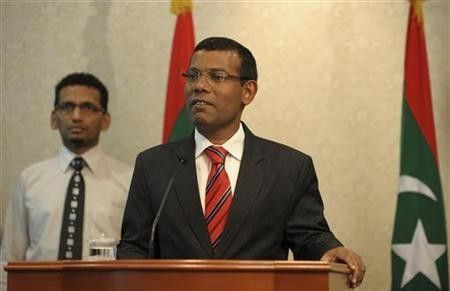VP Manik is New President of Maldives

President Mohamed Nasheed of the Maldives, widely credited with bringing democracy to the Indian Ocean archipelago, resigned on Tuesday after weeks of opposition protests erupted into a police mutiny, and handed power to his deputy.
President Mohamed Nasheed of the Maldives announcing his resignation on February 7, 2012.
Nasheed, the Sunni Muslim nation's first democratically elected president, handed over to Vice-President Mohamed Waheed Hassan Manik and said in a televised address I believe that if the government were to remain in power it would require the use of force which would harm many citizens.
Protests last year over the faltering economy and scrambling ahead of this year's presidential election, have seen parties adopting hardline Islamist rhetoric and accusing Nasheed of being anti-Islamic.
Nasheed's Maldivian Democratic Party said in a statement that rogue elements in the police force and supporters of his predecessor Maumoon Abdul Gayoom had overthrown the government and forced Nasheed to quit.
The MDP called for help from abroad to re-establish democracy and protect Nasheed and senior government members. A presidential aide told Reuters on condition of anonymity that Nasheed had been allowed to return to his home in Male and was no longer under military guard.
Hassan Saeed, leader of the DQP - a party in the opposition coalition - and an Indian diplomatic source in Colombo said Nasheed had asked India for help and been refused.
An Indian foreign ministry spokesman said the rebellion was an internal Maldives matter to be resolved by the Maldives.
India helped foil a coup on the islands in 1988 by sending a battalion of soldiers to back the government.
Britain's Foreign Office said a team of diplomats was on its way there and that London viewed developments with concern and called on all groups to find a peaceful way through these difficulties, in accordance with the Constitution.
U.N. Secretary-General Ban Ki-moon appealed for calm and said in a statement that the United Nations would remain a close partner of the Maldives.
A Commonwealth spokeswoman said the multinational body was gravely concerned and five Secretariat officials had arrived in the Maldives on Monday to see how the Commonwealth could help. We urge all to respect the rule of law and the constitution and to refrain from acts of violence, she said.
Late on Tuesday, tourists and air traffic were moving without disruption at the islands' main airport. People whizzed about on mopeds in the streets of the capital Male as usual.
The official presidential bungalow showed no signs of activity and a handful of Maldivians sauntered around shopping and civic centre Republic Square, which also houses the Grand Mosque and police headquarters, with no sign of security forces.
DEMOCRACY
Nasheed swept to victory in 2008, pledging to bring full democracy to the low-lying islands and speaking out passionately on the dangers of climate change and rising sea levels.
But he drew opposition fire for his arrest of a judge he said was in the pocket of Gayoom, who ruled for 30 years.
Protests at the arrest set off a constitutional crisis that had Nasheed - jailed in all for six years and arrested 27 times by Gayoom's government while agitating for democracy - defending himself against accusations of acting like a dictator.
The new president told Reuters that Nasheed was in protective police custody for his security and said calling the day's events a coup was a misrepresentation.
The people have been out on the street demonstrating for weeks now and finally it came to a point where the crowds (were) too overwhelming and the president tried to negotiate, was too late and the people prevailed on him to resign, Waheed said.
There had been a brief conflict between the military and the police, he said. The situation is now resolved. Both the police and the armed forces fully supported my taking office.
He said one priority was to create a durable environment for tourism since it's our main industry... We can assure all visitors to the Maldives the situation is perfectly normal.
In an address after being sworn in, Waheed said the rule of law had been fully established. I will not order the police, military or any person to do anything against the law ... Everyone will have the protection of the constitution and laws.
He called upon all political parties, the military and citizens to put aside personal hatreds and pledged to work to restore peace and prosperity of the nation, to deliver a harmonious and peaceful living to the people.
Waheed is expected to run a national unity government until the presidential election.
Thomas Cook Germany, part of the London-listed group (TCG.L), said it was discouraging its 900 customers now in the Maldives from travelling to Male. Airlines reported no cancellations of scheduled flights to the Maldives.
Germany advised against all but essential travel to Male, while Britain's advice to tourists was to exercise caution, avoid demonstrations and beware of spontaneous gatherings.
The trouble has been largely invisible to the 900,000 or so tourists who come every year to visit desert islands swathed in aquamarine seas, ringed by white-sand beaches.
Most tourists are whisked to their island resorts by seaplane or speedboat, where they are free to drink alcohol and get luxurious spa treatments, insulated from the everyday Maldives, a fully Islamic state where alcohol is outlawed and skimpy beachwear frowned upon.
Nasheed sought international help to stop the sea engulfing his nation and in 2009 held a cabinet meeting underwater, with ministers in scuba gear, to publicise the problem.
An Asian diplomat serving in Male told Reuters on condition of anonymity: No one remembers the underwater cabinet meeting. They remember Judge Abdulla Mohamed, a reference to Nasheed having the military arrest the judge accused of being in Gayoom's pocket.
© Copyright Thomson Reuters 2024. All rights reserved.





















